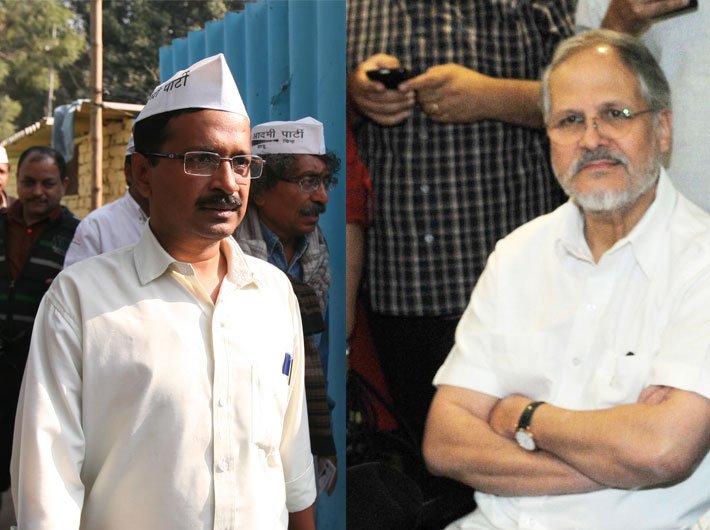CSB takes care of transfers and fixes tenures and mandated by the supreme court to insulate officials from the politicians
Another round of battle for supremacy is being waged in Delhi. The contentious transfer of ACB chief and Delhi home secretary has unnerved the officials of Delhi government. MK Meena was told not take charge of anti-corruption bureau and Delhi home secretary Dharam Pal was transferred because he signed Meena’s posing order at the instance of lieutenant governor Najeeb Jung. Dharam Pal was shunted out as Delhi chief minister Arvind Kejriwal is against LG’s administrative powers. Meena was targeted as he had superseded Kejriwal's hand-picked officer SS Yadav.
Fed up and frustrated by such political games being played at their expense, the officials of Delhi government have sought constitution of civil services board (CSB). The CSB will be responsible for appointment, transfers and tenures of the officials.
The supreme court had directed the centre and the states in November 2013 to constitute the CSBs to decide on posting of senior administrative, police and forest service officers on fixed term and to insulate bureaucratic transfers from political interference.
Read more: Jung’s man at ACB asked to go back by Kejriwal’s govt
But nearly 30 states and union territories including Delhi are yet to set up CSBs. It is clear that the politicians are reluctant to give up their control over the civil services.
What is CSB?
The administrative reforms commission has in depth into to the issue of CSB and in its report it acknowledges the work done by another panel – Surinder Nath committee.
The ARC quotes from Nath committee report as:“The principal problem with the present system of selections for particular positions under the Central Staffing Scheme is that there is no systematic matching of the competency requirements for particular positions and the backgrounds of the candidate officers. Also, there is no formal system of eliciting the interests and preferences of officers for particular positions, consistent with their background and broader career interests.
These lead to unseemly scrambles for particular prestigious positions, in which unstructured infl uences are pervasive. The result is, frequently, a glaring mismatch between the required competencies and the backgrounds of officers selected for the positions. Career profi les of officers end up displaying the features of a “random walk”, with no regard to building skills and capabilities. In the long-term, these result in poor policy-making and implementation, as well as insufficient capacity for policy-making and public management.”
The Committee had recommended that Parliament may enact a Civil Services Act setting up a Civil Services Board for the Union Government which will perform functions presently being done by the Central Board presided over by the Cabinet Secretary. It further recommended that the Civil Services Act may also provide for a special Committee of Secretaries to prepare panels of names for appointment to posts of Additional Secretaries and Secretaries to Government of India.
The ARC report concluded that “the Commission is of the view that in posting an officer the emphasis should be on getting the most suitable person for the post based on his/her past experience, future potential and overall record. The mechanisms and the processes created for posting an officer should be able to achieve this end. While addressing this issue, the Commission has examined the following aspects of placement: a. Process of selection of officers for different positions and the institutional mechanism (on) b. assignment of domains to officers, c. tenure of postings, d. field postings of officers during the initial part of their careers."
Rules on CSB
The department of personnel and training (DoPT) has issued a set of rules on officials. According the rules the officers of the three premier services — IAS, IPS and IFoS — will now spend a minimum of two years in each posting.
However, transfers and postings before two years will be done by a civil services board to be constituted by states.
A cadre officer, appointed to any cadre post, shall hold the office for at least two years unless he or she is promoted, retired or sent on deputation outside the state or for training exceeding two months, the rules said.
“The centre or the state government... may transfer a cadre officer before the minimum specified period on the recommendation of the civil services board,” the rules said.
States have now been mandated to constitute a civil services board. It is to be headed by the chief secretary. However, the competent authority may reject the recommendation of the civil services board by recording the reasons for the same.
For transfer and postings of Indian Administrative Service officers, the board will have the senior-most additional chief secretary or chairman, board of revenue or financial commissioner, or an officer of equivalent rank and status as member, and principal secretary or secretary of the department of personnel in the state government, as member secretary.
For the posting and transfer of Indian Police Service officers, the board will have two more members — principal secretary or secretary, home, and the director general of police.
For Indian Forest Service officers as well, the board is to have two additional members — principal secretary or secretary, forest, and the state’s principal chief conservator of forest.
“All appointments of cadre officers shall be made on the recommendation of the civil services board,” state the DoPT rules.
